Pistachios, scientifically known as Pistacia vera, are not just a delicious and crunchy snack but also a nutritional powerhouse. Native to the Middle East, pistachios have been consumed for centuries and have recently gained recognition as a valuable addition to a healthy diet. This article delves into the pistachios benefits, supported by scientific research.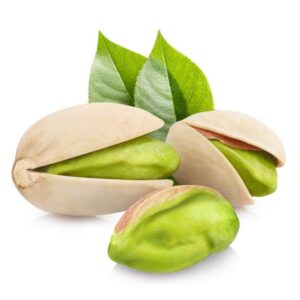
Heart Health
One of the standout benefits of pistachios is their positive impact on heart health. Studies have shown that regular consumption of pistachios can lead to lower levels of bad LDL cholesterol while increasing levels of good HDL cholesterol. The high levels of monounsaturated and polyunsaturated fats, along with phytosterols, fiber, and antioxidants found in pistachios, contribute to reducing the risk of cardiovascular diseases .
Furthermore, pistachios are rich in potassium, a mineral known for its blood pressure-regulating properties. This characteristic is pivotal for maintaining a healthy cardiovascular system, as proper blood pressure levels are essential for reducing the risk of hypertension and related complications.
Additionally, the unique combination of nutrients in pistachios, such as l-arginine, contributes to improved blood vessel function, fostering overall heart health. Incorporating pistachios into a balanced diet can thus serve as a flavorful and nutritious strategy for promoting cardiovascular well-being.
Reference: Hernández-Alonso, P., et al. (2017). Effect of pistachio consumption on plasma lipoprotein subclasses in pre-diabetic subjects. Nutr J, 16(1), 21.
Weight Management
Contrary to what one might expect, pistachios can be a valuable ally in weight management. Despite being calorie-dense, pistachios’ unique combination of protein, fiber, and healthy fats can promote a feeling of fullness and reduce overall calorie intake. Research suggests that individuals who incorporate pistachios into their diets tend to snack less and have better control over their appetite .
The combination of protein and fiber in these nuts not only enhances satiety but also helps regulate blood sugar levels, preventing sudden spikes and crashes that can lead to unhealthy snacking. Additionally, the healthy fats found in pistachios, including monounsaturated and polyunsaturated fats, play a role in supporting metabolism and promoting the body’s overall well-being, making them a smart choice for those seeking a balanced and satisfying snack in their weight management journey.
Reference: Hernández-Alonso, P., et al. (2019). Nutrients 11(5), 1004.
Blood Sugar Control
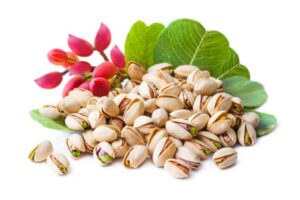 For individuals with diabetes or those at risk of developing it, pistachios offer a blood sugar-friendly option. These nuts have a relatively low glycemic index, meaning they cause a gradual rise in blood sugar levels. Additionally, pistachios contain compounds that can improve insulin sensitivity, making them a suitable choice for maintaining healthy blood sugar levels.
For individuals with diabetes or those at risk of developing it, pistachios offer a blood sugar-friendly option. These nuts have a relatively low glycemic index, meaning they cause a gradual rise in blood sugar levels. Additionally, pistachios contain compounds that can improve insulin sensitivity, making them a suitable choice for maintaining healthy blood sugar levels.
Pistachios stand out for their unique combination of fiber, healthy fats, and antioxidants, contributing to their positive impact on blood sugar control. The fiber content in pistachios slows down the absorption of sugars, promoting sustained energy release and preventing rapid spikes in blood glucose.
Furthermore, the monounsaturated and polyunsaturated fats found in pistachios have been linked to improved glycemic control and reduced inflammation, making them a valuable addition to the diet for individuals seeking to manage or prevent diabetes.
Reference:Parham, M., et al. (2014). The effects of pistachio on weight, metabolic and inflammatory parameters in patients with type 2 diabetes. Int J Endocrinol Metab, 12(3), e15997.
Antioxidant Power
Pistachios are rich in antioxidants, such as lutein, zeaxanthin, and gamma-tocopherol. These compounds help protect the body’s cells from oxidative damage caused by free radicals, thereby reducing the risk of chronic diseases and promoting overall well-being.
Pistachios stand out for their unique combination of antioxidants, with high levels of polyphenols and vitamin E, which contribute to their exceptional antioxidant power. The presence of specific compounds like resveratrol and anthocyanins further enhances the protective effects, making pistachios not only a delicious snack but also a valuable addition to a health-conscious diet.
Reference: Mollard, R. C., et al. (2016). The acute effects of a high-fat meal with and without red raspberry jam on endothelial function, oxidative stress, and metabolic parameters in healthy individuals. Nutr J, 15(1), 8.
Nutrient-Rich Profile
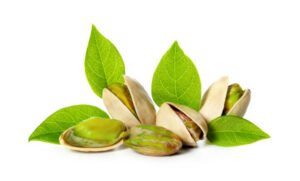 Pistachios are not only a source of healthy fats and protein but also a treasure trove of essential nutrients. They are packed with vitamins (vitamin B6, vitamin K), minerals (phosphorus, potassium, magnesium), and dietary fiber, making them a well-rounded addition to any diet.
Pistachios are not only a source of healthy fats and protein but also a treasure trove of essential nutrients. They are packed with vitamins (vitamin B6, vitamin K), minerals (phosphorus, potassium, magnesium), and dietary fiber, making them a well-rounded addition to any diet.
These green gems also boast a significant amount of thiamine (vitamin B1), crucial for energy metabolism and nerve function. The presence of phytochemicals, like polyphenols, contributes to their potential anti-inflammatory and heart-protective properties, elevating pistachios beyond a mere snack to a powerhouse of nutritional benefits.
Reference: Dreher, M. L., & Davenport, A. J. (2013). J Am Coll Nutr, 32(3), 185-195.
Eye Health
Pistachios are a rich source of two essential carotenoids, lutein, and zeaxanthin, which play a crucial role in maintaining eye health. These compounds are known to accumulate in the retina, where they help protect against age-related macular degeneration (AMD) and cataracts, two common eye disorders.
Apart from lutein and zeaxanthin, these nuts also contain vitamin E, an antioxidant that further supports eye health by reducing oxidative stress. Additionally, pistachios provide essential minerals like zinc, which is essential for maintaining the health of the retina and preventing vision loss. The synergistic effect of these nutrients in pistachios makes them a delicious and wholesome choice for promoting long-term eye health
Reference: Seddon, J. M., et al. (1994). Dietary carotenoids, vitamins A, C, and E, and advanced age-related macular degeneration. Eye Disease Case-Control Study Group. JAMA, 272(18), 1413-1420.
Gut Health and Digestion
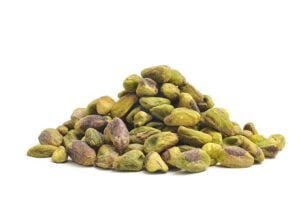 Pistachios contain dietary fiber, which is essential for maintaining a healthy digestive system. Fiber promotes regular bowel movements, prevents constipation, and supports a diverse gut microbiome. Additionally, the prebiotic properties of pistachios can nourish beneficial gut bacteria, leading to better overall gut health and potentially enhanced immunity.
Pistachios contain dietary fiber, which is essential for maintaining a healthy digestive system. Fiber promotes regular bowel movements, prevents constipation, and supports a diverse gut microbiome. Additionally, the prebiotic properties of pistachios can nourish beneficial gut bacteria, leading to better overall gut health and potentially enhanced immunity.
The specific type of fiber found in pistachios, known as soluble fiber, not only aids in regular bowel movements but also helps manage blood sugar levels, promoting a more stable digestive process. Moreover, pistachios contain polyphenols and antioxidants, which can have anti-inflammatory effects in the gut, further supporting a balanced and resilient digestive system.
Reference: Gibson, G. R., & Roberfroid, M. B. (1995). Dietary modulation of the human colonic microbiota: introducing the concept of prebiotics. J Nutr, 125(6), 1401-1412.
Skin Health
The antioxidants found in pistachios, such as vitamin E, can contribute to healthier skin. These antioxidants help protect the skin from oxidative stress caused by environmental factors like UV radiation and pollution.
Pistachios stand out for their unique combination of skin-nourishing properties. Rich in essential fatty acids, they aid in maintaining the skin’s natural moisture barrier, preventing dryness and promoting a supple texture.
Additionally, the presence of lutein and zeaxanthin in pistachios contributes to skin elasticity and may help protect against signs of aging. Incorporating pistachios into your skincare routine can be a delicious and beneficial way to support overall skin health.
Reference: Bérardesca, E., & Maibach, H. I. (1992). Sensitive skin: A comprehensive guide. Springer Science & Business Media.
Cognitive Health
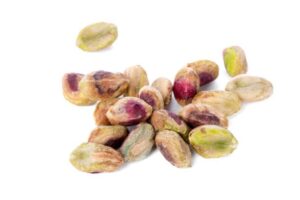 Emerging research suggests that pistachios may have a positive impact on cognitive function. They are a good source of vitamin B6, which is involved in brain development and function. Moreover, pistachios contain a range of antioxidants that can help protect brain cells from oxidative stress, potentially reducing the risk of age-related cognitive decline and neurodegenerative diseases like Alzheimer’s .
Emerging research suggests that pistachios may have a positive impact on cognitive function. They are a good source of vitamin B6, which is involved in brain development and function. Moreover, pistachios contain a range of antioxidants that can help protect brain cells from oxidative stress, potentially reducing the risk of age-related cognitive decline and neurodegenerative diseases like Alzheimer’s .
Furthermore, pistachios are rich in magnesium, a mineral that plays a crucial role in supporting overall cognitive health. Magnesium has been associated with enhanced learning and memory functions, and its presence in pistachios adds to the nuts’ cognitive benefits.
Additionally, the combination of fiber, healthy fats, and protein in pistachios contributes to sustained energy levels, promoting optimal brain performance and focus. Including pistachios in a balanced diet may offer a holistic approach to supporting cognitive well-being through a combination of essential nutrients and protective compounds.
Reference: Johnson, E. J. (2012). Role of lutein and zeaxanthin in visual and cognitive function throughout the lifespan. Nutrition Reviews, 70(4), 222-231.
Muscle Health
Pistachios are an excellent source of plant-based protein. Protein is essential for muscle repair and growth. Incorporating pistachios into your diet, especially as a post-workout snack, can help support muscle recovery and maintenance, making them a valuable addition to the diets of athletes and fitness enthusiasts.
Furthermore, pistachios offer a unique combination of amino acids, including essential amino acids like leucine, which plays a crucial role in stimulating muscle protein synthesis. This makes pistachios a particularly beneficial snack for optimizing the body’s response to exercise and promoting lean muscle mass.
Additionally, the presence of antioxidants, such as vitamin E, in pistachios helps reduce exercise-induced oxidative stress, contributing to overall muscle health and resilience. Embracing pistachios as part of a well-balanced diet not only supports muscle repair and growth but also provides a tasty and convenient way to enhance your fitness journey.
Reference: Phillips, S. M., & Van Loon, L. J. (2011). Dietary protein for athletes: From requirements to optimum adaptation. Journal of Sports Sciences, 29(sup1), S29-S38.
Nutrient Absorption
Pistachios contain healthy fats that can enhance the absorption of fat-soluble vitamins, such as vitamins A, D, E, and K. Consuming pistachios alongside foods rich in these vitamins can improve their bioavailability and ensure your body gets the maximum benefit from them.
Furthermore, pistachios are a rich source of dietary fiber, which plays a crucial role in promoting overall digestive health. The fiber content in pistachios can facilitate the absorption of essential nutrients by supporting a healthy gut microbiome.
Additionally, the combination of fiber and healthy fats in pistachios may contribute to a slower digestion process, allowing for more efficient nutrient absorption and sustained energy release. Incorporating pistachios into a well-balanced diet can thus offer unique advantages in optimizing nutrient absorption and promoting overall nutritional well-being.
Reference: Hollis, B. W., & Wagner, C. L. (2007). Nutritional vitamin D status during pregnancy: reasons for concern. Current Opinion in Clinical Nutrition & Metabolic Care, 10(6), 726-733.
Nutritional value per 100 grams of pistachios (Pistacia vera)
- Calories: Approximately 562 calories.
- Protein: About 20 grams, making pistachios a good source of plant-based protein.
- Fat: Approximately 45 grams, consisting mainly of healthy monounsaturated and polyunsaturated fats. These fats are heart-healthy and can help reduce bad LDL cholesterol levels.
- Carbohydrates: Around 28 grams, with dietary fiber accounting for a portion of the carbs.
- Dietary Fiber: Roughly 10 grams, which aids in digestion and contributes to a feeling of fullness.
- Sugars: About 8 grams, primarily natural sugars found in the nuts.
- Vitamins: Pistachios are rich in several vitamins, including vitamin B6, which is important for brain health, and vitamin K, which plays a role in blood clotting and bone health.
- Minerals: They provide essential minerals such as phosphorus, potassium, and magnesium, which are important for bone health, muscle function, and maintaining electrolyte balance.
- Antioxidants: Pistachios contain antioxidants like lutein, zeaxanthin, and gamma-tocopherol, which help protect cells from oxidative damage.
- Phytosterols: These compounds can help lower cholesterol levels and promote heart health.
- Amino Acids: Pistachios are a source of essential amino acids, including arginine, which is beneficial for heart health.
- Water Content: Pistachios have a moderate water content, contributing to their overall hydration value.
It’s important to note that while pistachios are nutrient-dense, they are also calorie-dense due to their fat content. Therefore, portion control is essential when incorporating them into your diet, especially if you are watching your calorie intake. A small handful of pistachios, roughly 1 ounce (about 28 grams), can be a satisfying and healthy snack.
Conclusion
Incorporating pistachios into your daily diet can offer a wide array of health benefits, from improving heart health and aiding in weight management to enhancing blood sugar control and providing a rich source of antioxidants. However, it’s essential to consume pistachios in moderation, as they are calorie-dense. Including a handful of pistachios as part of a balanced diet can contribute to a healthier and more vibrant life.
 Indulge your taste buds with a burst of vibrant flavors in this exquisite “Rocket and Pistachio Pesto Pasta” recipe by Jamie Oliver. If you’re looking for a quick, delicious, and health-conscious meal that celebrates the essence of Italian cuisine, you’ve come to the right place. This dish combines the peppery freshness of rocket (arugula) and the rich, nutty goodness of pistachios to create a pesto that’s not only irresistibly tasty but also packed with nutrients.
Indulge your taste buds with a burst of vibrant flavors in this exquisite “Rocket and Pistachio Pesto Pasta” recipe by Jamie Oliver. If you’re looking for a quick, delicious, and health-conscious meal that celebrates the essence of Italian cuisine, you’ve come to the right place. This dish combines the peppery freshness of rocket (arugula) and the rich, nutty goodness of pistachios to create a pesto that’s not only irresistibly tasty but also packed with nutrients.
Contraindications or precautions to consider when consuming pistachios
Allergies:
Individuals with tree nut allergies, including pistachio allergies, should avoid pistachios altogether, as consuming them can trigger allergic reactions, which can range from mild itching or swelling to severe anaphylaxis.
Portion Control:
While pistachios are nutritious, they are calorie-dense due to their fat content. Overconsumption can lead to excessive calorie intake, which may not be suitable for those trying to manage their weight.
Digestive Sensitivity:
Some individuals may have a sensitivity to high-fiber foods, and consuming large quantities of pistachios at once can lead to digestive discomfort, including bloating or diarrhea. It’s advisable to eat them in moderation, especially if you have a sensitive digestive system.
Medication Interactions:
If you are taking medications that interact with potassium or other nutrients found in pistachios, consult with a healthcare professional to ensure your diet is appropriate for your medical condition and medication regimen.
Kidney Stones:
Pistachios are a source of oxalates, which, in excessive amounts, can contribute to the formation of kidney stones in susceptible individuals. If you have a history of kidney stones, it’s a good idea to moderate your pistachio intake and stay well-hydrated.
Caloric Considerations:
If you are on a very low-calorie diet or have specific dietary restrictions, such as in certain medical conditions, monitor your pistachio consumption carefully to ensure it aligns with your dietary requirements.
Storage:
Pistachios are prone to spoilage if not stored properly. Keep them in an airtight container in a cool, dry place to maintain their freshness and prevent mold or rancidity.
It’s crucial to consider your individual health, dietary, and allergic factors when incorporating pistachios or any food into your diet. If you have specific concerns or medical conditions, consult with a healthcare professional or a registered dietitian to determine how pistachios can fit into your overall dietary plan safely and effectively.
Fascinating Facts About Pistachios
The Color Conspiracy:
While pistachios are commonly associated with their vibrant green hue, not all of them conform to this norm. In some instances, you might stumble upon pistachios with a slightly reddish or purple tint. This color aberration, though rare, adds a whimsical touch to the pistachio palette.
Nutrient Ninja:
Pistachios are the silent superheroes of the nutrient world. Hidden within their petite forms are higher levels of vitamin B6 compared to other nuts. This nutrient ninja plays a crucial role in everything from brain development to immune system function, making pistachios an unexpected powerhouse.
Magnetic Shells:
In a bizarre twist of nature, pistachio shells exhibit a magnetic quality. If you’ve ever played around with a bowl of pistachios, you might have noticed that the shells tend to cluster together. This magnetic phenomenon adds an unexpected physics lesson to your snacking experience.
Shell-Opening Etiquette:
Ever wondered why some pistachios refuse to crack open? It turns out, pistachios follow an unspoken etiquette when it comes to opening up. The closed ones are actually sealed shut, indicating an underdeveloped nut. It’s a quirky reminder that not every pistachio is ready to reveal its inner treasure.
Ice Cream Color Code:
Pistachio ice cream, a beloved flavor, doesn’t always rely on pistachios for its iconic green color. In some instances, spinach or food coloring may be responsible for the vibrant hue. The next time you indulge in this frozen treat, ponder the potential impostors behind its green facade.
Nuttier Than Fiction:
Pistachios have graced the silver screen in an unexpected way. In the classic film “The Wizard of Oz,” the lush green landscape of the Emerald City was brought to life using crushed pistachio shells. This cinematic repurposing adds a touch of pistachio magic to the iconic movie.
Gastronomic Artistry:
Pistachios have transcended their culinary confines to become a medium for artistic expression. From intricate mosaics to detailed sculptures, artists around the world have embraced pistachios as a unique and eco-friendly material for their creations. It’s a testament to the nut’s cultural and artistic influence.
Self-Preservation Mechanism:
Pistachios possess a unique self-preservation instinct. In times of extreme heat, these nuts have a curious habit of closing their shells, protecting the precious kernel within. It’s a quirky survival mechanism that showcases the nut’s resilience in challenging environments.
Secret Signals in Shells:
Pistachios are known to communicate through their shells. If you’ve ever observed a pile of pistachio shells, you might notice that some have a distinct mark resembling an “S” or a smiley face. This cryptic communication, though not fully understood, adds a touch of mystery to the aftermath of a pistachio feast.
Aromatic Anomalies:
While the flavor of pistachios is well-known, their aromatic properties take a back seat. However, pistachios actually emit a faint, sweet fragrance that becomes more pronounced when the nuts are freshly cracked. It’s a subtle olfactory secret that often goes unnoticed in the gustatory celebration.
Firecracker Fission:
In a quirk of agricultural innovation, researchers have developed a strain of pistachios known as the “Firecracker.” What sets them apart is not just their explosive name but also their red and yellow shells. These vibrant variations add a burst of color to the pistachio orchards.
Magnetic Mischief Continues:
The magnetic allure of pistachio shells doesn’t end with clustering. In some instances, pistachios have been observed to rotate and align themselves in a specific direction, almost like a compass. The reason behind this magnetic dance remains an enigma in the world of nut physics.
Historical Heist Connection:
Pistachios have a peculiar historical connection to heists. In 2016, a group of thieves stole a whopping $150,000 worth of pistachios from a California farm. This nutty caper, involving a large truck and an illicit market, added a touch of intrigue to the criminal underworld’s choice of loot.
Pistachio Palate Cleanse:
Pistachios have found an unexpected role in the world of gastronomy as a palate cleanser. Some chefs use crushed pistachios to create a neutralizing base between different courses, providing a subtle transition for the taste buds. It’s a culinary secret that adds a nutty twist to the art of fine dining.
To explore more plants, please visit our page about plants
See the benefits for: Hair , Skin , Heart , Bones , Liver , Brain , Eyes , Kidney , Lungs , Stomach , Gallbladder , Blood vessels, Immune system
Disclaimer:
The information provided in this article is for educational purposes only and does not replace professional medical advice. Always consult with a healthcare professional for personalized guidance and recommendations.
